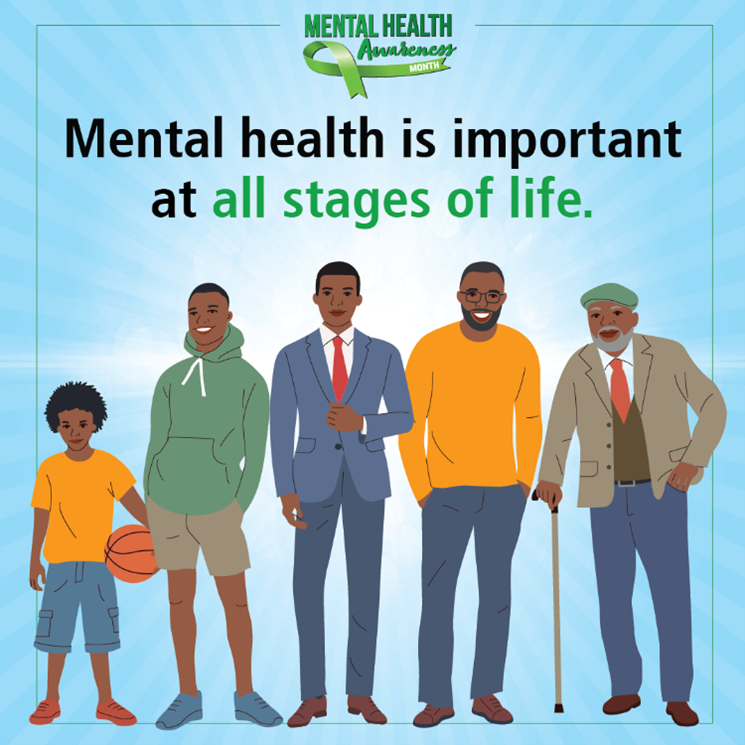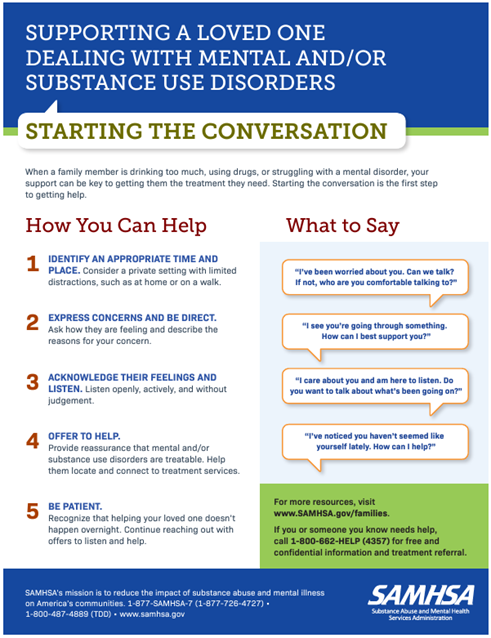Published: May 8, 2024
"Each one of us has a role to play in changing the narrative and ending the stigmatization of mental health issues."
The Substance Abuse and Mental Health Services Administration (SAMHSA) defines mental health as our emotional, psychological, and social well-being. It affects how we think, feel, and act, and helps determine how we handle stress, relate to others, and make choices.
Mental health is important at every stage of life, from childhood and adolescence through adulthood. Over the course of your life, if you experience mental health problems, your thinking, mood, and behavior could be affected.

According to the National Institutes of Health (NIH) , Mental Health Awareness Month was founded in 1949 by the organization Mental Health America, with a mission to educate Americans about mental illness and mental health. In 1955, Mental Health America joined and supported the Commission on Mental Illness and Health which was created by Congress. In July 1955, a joint resolution by Congress, "The Mental Health Study Act of 1955" (69 Stat. 381), requested a nationwide analysis to explore and help solve the interrelated aspects of mental health. Read more about the formation and goals of the Joint Commission on the NIH website.
Recent Legislation and Laws Enacted Related to Mental Health
42 U.S.C. 10801
Title 42 - The Public Health and Welfare,
Chapter 114 - Protection and Advocacy for Individuals with Mental Illness.
Commander John Scott Hannon Veterans Mental Health Care Improvement Act of 2019 P.L. 116-171, Enacted 10/17/2020,
This public law makes updates related to Department of Veterans Affairs (VA) transition assistance, mental health care, care for women veterans, and telehealth care.
National Suicide Hotline Designation Act of 2020 P.L. 116-172, Enacted 10/17/2020, This public law requires the Federal Communications Commission (FCC) to designate 9-8-8 as the universal telephone number for a national suicide prevention and mental health crisis hotline.
Veterans COMPACT Act of 2020, P.L. 116-214, Enacted 12/5/2020,
This public law implements programs, policies, and reports related to Department of Veterans Affairs (VA) transition assistance, suicide care, mental health education and treatment, health care, and women veteran care.
Crisis Stabilization and Community Reentry Act of 2020, P.L. 116-281, Enacted 12/31/2020, This public law authorizes the Department of Justice to award grants for states, Native American tribes, local governments, and community-based nonprofit organizations to provide clinical services for people with serious mental illness and substance use disorders who need mental health services upon release from a correctional facility.
Advancing Research to Prevent Suicide Act, P.L. 116-339, Enacted 1/13/2021, This public law directs the National Science Foundation (NSF) to award competitive, merit-reviewed grants to institutions of higher education (or their consortia) to support multidisciplinary, fundamental research with potential relevance to suicide, including potential relevance to prevention and treatment.
Search GovInfo for hearings,
and
statements in the Congressional Record related to mental health issues.
Additional Resources
- Read the Fact Sheet: Biden-Harris Administration Announces New Actions to Tackle Nation’s Mental Health Crisis (May 18, 2023) on the White House's website.
- Check out the National Institutes of Health's Quarterly Wellness News to download their Mental Health Awareness Month toolkit and find other mental health resources and activities.
- Visit the SAMHSA website to find more information on mental health awareness , mental topics such as health conditions, warning signs and symptoms, and tips for living well with a mental health condition. Also see their 2024 Mental Health Awareness Month Toolkit resources.
- See more about Caring for Your Mental Health from NIH.
- Take a look at the Center for Disease Control and Prevention's Mental Health webpage to find help with resources and support.
- Explore Youth Topics on Mental Health on the youth.gov website.

